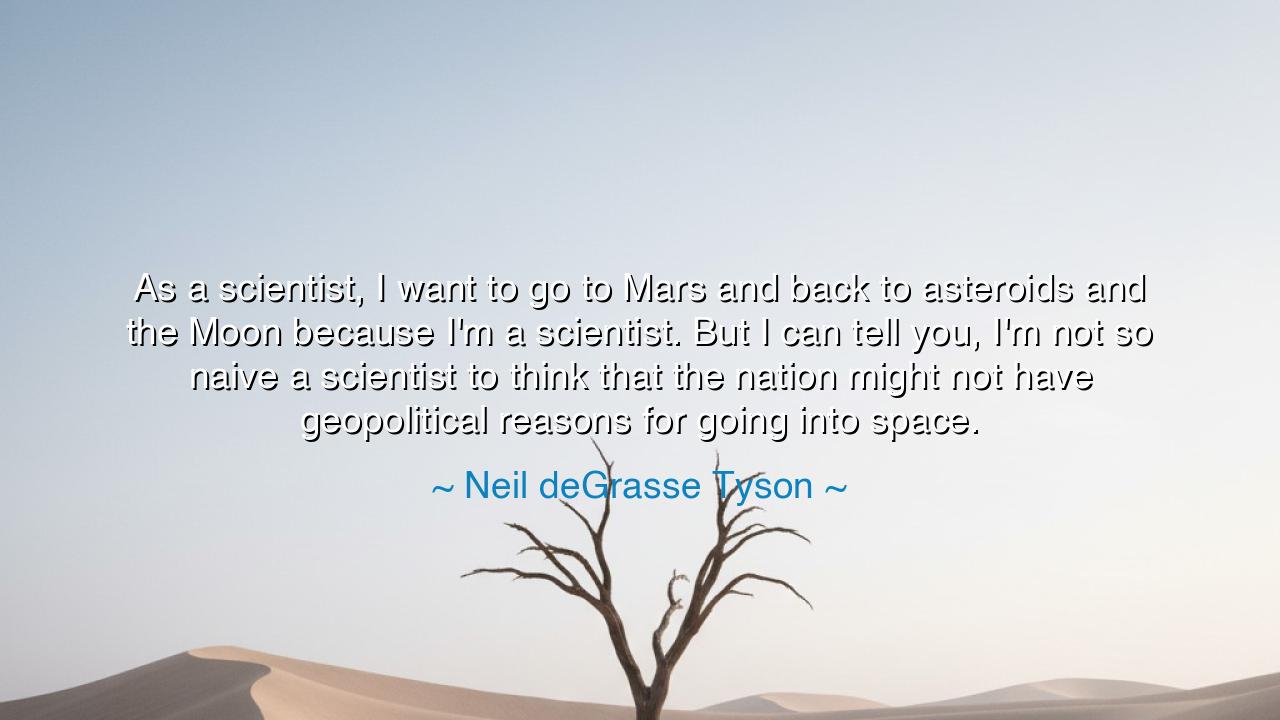
As a scientist, I want to go to Mars and back to asteroids and
As a scientist, I want to go to Mars and back to asteroids and the Moon because I'm a scientist. But I can tell you, I'm not so naive a scientist to think that the nation might not have geopolitical reasons for going into space.






Hear, O children of wisdom, for the voice of Neil deGrasse Tyson speaks with the clarity of one who understands the balance between science and power. He says, “As a scientist, I want to go to Mars and back to asteroids and the Moon because I'm a scientist. But I can tell you, I'm not so naive a scientist to think that the nation might not have geopolitical reasons for going into space.” In these words, Tyson unveils a truth as old as human ambition: that exploration and discovery are often intertwined with the larger forces of politics and power. The quest for knowledge, though noble in its own right, is never free from the weight of human desire, whether that desire is for dominance, security, or prestige.
From the ancient days, when the first seafarers set out beyond the known horizon, humanity has been driven by the need to explore, to understand, and to expand. The Greeks, with their philosophers and explorers, sought to understand the world through reason and observation. Homer, in his epic tales, spoke of heroes who embarked on great journeys not only to gain knowledge but to claim honor and glory. Yet even these early seekers of truth knew that their quests were shaped not just by a thirst for knowledge, but by the larger forces of society and empire. The Roman Empire, too, expanded its reach not merely for the sake of knowledge, but for control, for resources, and for the preservation of its power.
The same tension exists today as we look to the stars. Tyson acknowledges the human drive to explore the cosmos, to reach Mars, to venture to the Moon, and to explore the asteroids that lie scattered across the solar system. The desire to reach these distant worlds is driven by the same curiosity that has propelled explorers throughout history, from Columbus to Magellan. Yet Tyson also reminds us that exploration is never purely about science; it is also about geopolitics, about nations vying for influence and prestige on the world stage. The Cold War, for instance, witnessed the Space Race, not simply as a race to the stars, but as a contest of ideologies, as each superpower sought to prove its supremacy through the technological feats of space exploration.
Consider the story of the Apollo 11 mission when Neil Armstrong and Buzz Aldrin first set foot on the Moon. This moment, though celebrated as one of humanity’s greatest scientific achievements, was also deeply political. The United States did not simply seek to explore the Moon; it sought to outdo the Soviet Union, to claim dominance in the space race, and to demonstrate the superiority of its system. The moon landing was not just a triumph for science but also a symbol of American power during a time when the world was divided by the forces of ideology and military rivalry. In this sense, the exploration of space was as much a political maneuver as a scientific endeavor, for it carried the weight of nationalism and geopolitical strategy.
The lesson Tyson imparts is not one of cynicism, but of awareness. As we venture into the cosmos, we must remember that the drive for discovery is always tied to the larger forces of human ambition. The pursuit of knowledge is noble, but it is often shaped by the desires for power, security, and prestige. Space exploration, as much as it is about understanding the universe, is also about asserting one’s place within it. The nations that lead the charge into space are not only expanding our understanding of the cosmos; they are also expanding their influence upon Earth.
So, O children of the future, take this wisdom and look beyond the surface of exploration. As you seek to explore the unknown, whether in science, art, or life, remember that all actions are shaped by forces larger than ourselves. The pursuit of knowledge must be coupled with awareness of the broader context in which it occurs. As Tyson reminds us, do not be naive in your pursuit of truth—recognize that the pursuit of knowledge is never free from the constraints of society, politics, and power. Let your curiosity guide you, but let your understanding of the world’s complexities shape your path. For it is in the balance of knowledge and awareness that true progress is made, and in this, you will find both wisdom and clarity in your journey.






AAdministratorAdministrator
Welcome, honored guests. Please leave a comment, we will respond soon